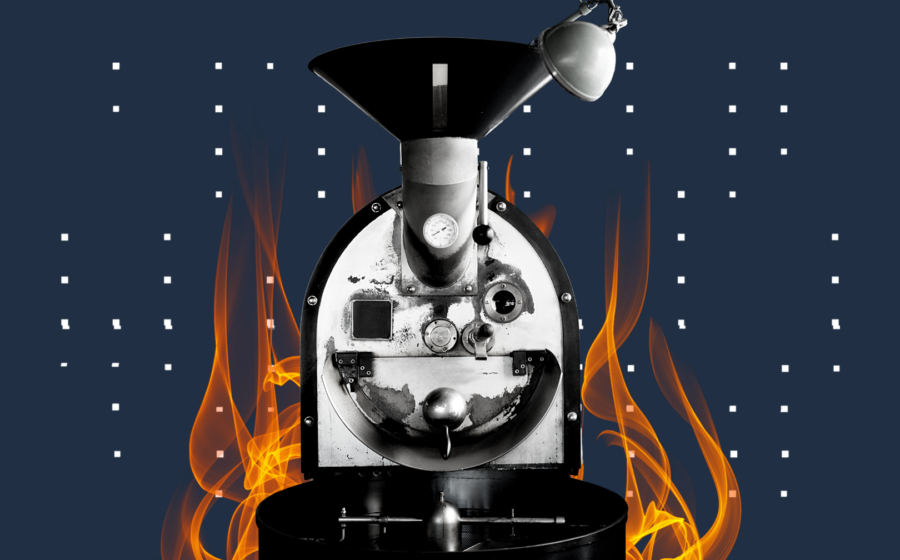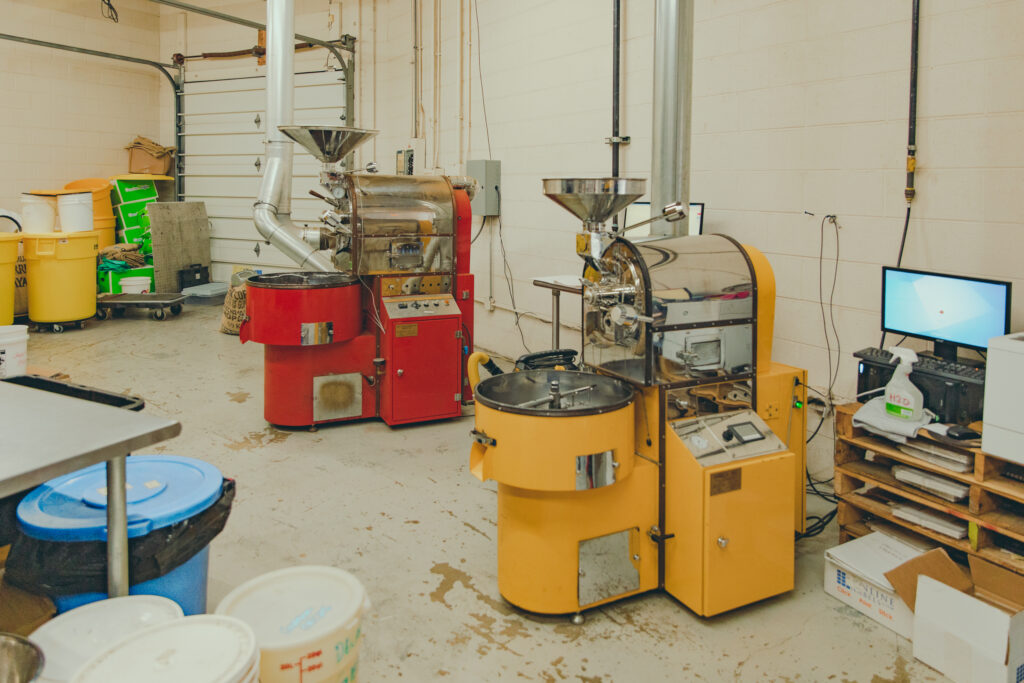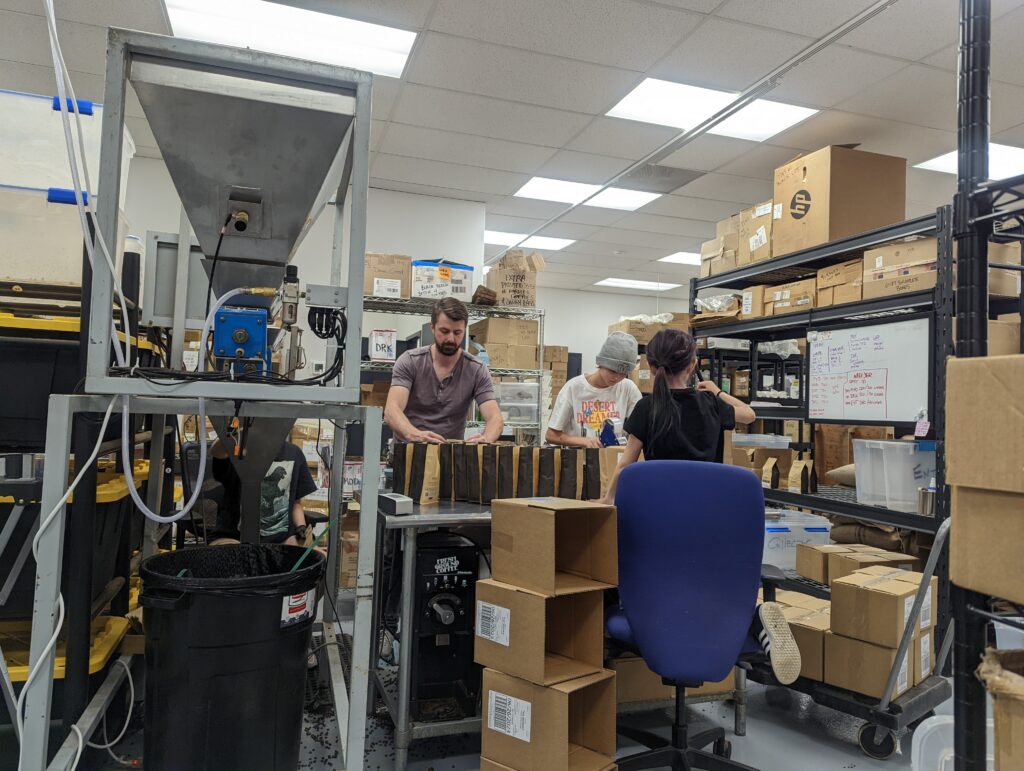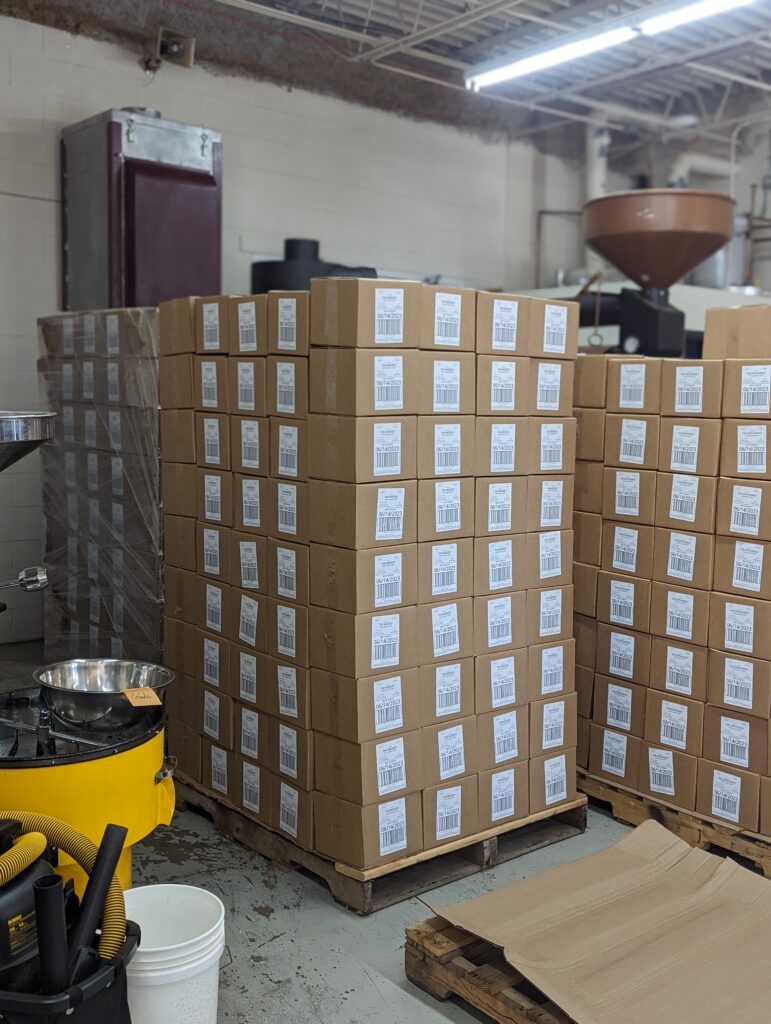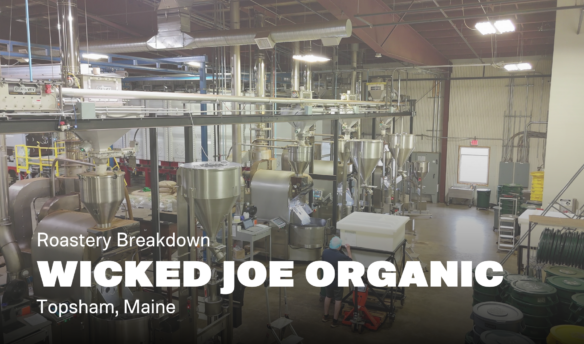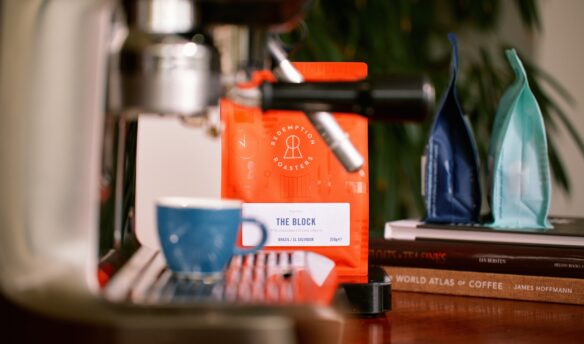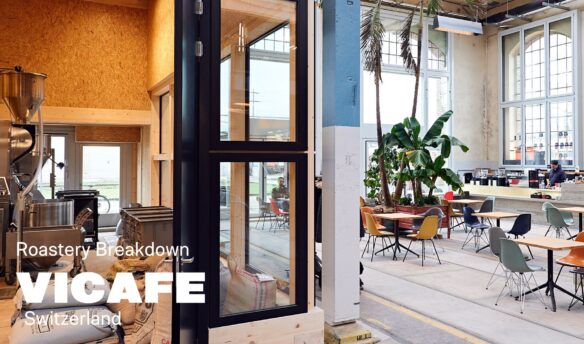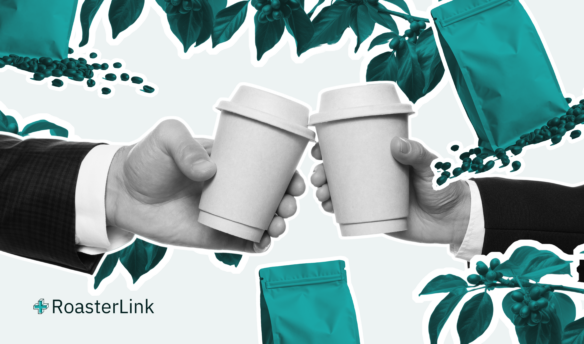In 2021, Modest Coffee received what seemed like a dream order for a wholesale roasting business: 6,000 bags of roasted coffee (or, so they thought). By the time co-founders Jenni and Marcus Contaldo realized it was too good to be true, it was too late to change course. What started as a lucrative order from a major national retailer cascaded into a pile of debt—to the tune of nearly $250,000.
When the deal fell through, Jenni and Marcus were left with tens of thousands of pounds of roasted coffee and a bill they couldn’t afford. In a miraculous turnaround, the couple ended up selling nearly all of it in less than twenty-four hours. Though this is a story of atypical magnitude, the series of events is not uncommon. When roasters partner with large distributors, the risks can be incredible. The couple’s story is an essential lesson on navigating distributor deals and what to do in case of a crisis.
The Risky Allure of The National Distributor
The Contaldos started Modest Coffee in 2013 as a roastery and ecommerce store. Jenni and Marcus began selling their coffee at local farmers’ markets, then earned placements in a few local boutique grocery stores. After several years of successfully increasing and managing their own retailer relationships, the couple was ready to move into their next era of growth: working with large distributors.
“We thought that moving into a distributor relationship would be the way we could replicate our local success into our broader region, and nationally,” says Jenni. A local grocery store owner connected Jenni and Marcus with a food broker who helped the couple identify a large national retailer to partner with. “We selected this distributor because they sell to a lot of smaller specialty stores.”
Modest Coffee became an official partner of the distributor.“ We signed a contract saying we wouldn’t get paid on our first order until after it was all sold through at the retailer,” says Jenni, echoing a common practice amongst large distributors. “We knew that going in and figured it’d be a few thousand dollars worth of coffee. We could handle that, especially if it was a gateway to more orders.”
It was a measured risk for Modest. Play the game by the distributor’s rules, delay payment of a few thousand dollars for their first order, and if it goes well, gain access to a massive number of retailers across the country.
The Big Order Where Everything Went Wrong
Six months after becoming a vendor with the distributor, Jenni got an email she couldn’t believe. One of the largest retailers in the country was going to pilot a specialty coffee program, and they wanted Modest Coffee to participate with a 6,000-unit order. At the time, the Contaldos believed this meant 6,000 bags of coffee.
Looking back, Jenni and Marcus see a handful of times when they should have asked more questions, pushed back against sales reps and brokers, and confirmed the details in writing. The first red flag came from the broker negotiating the deal: they said, despite the contract they had signed, Modest Coffee would be paid in full for their first order as soon as the distributor had received all the coffee.
“Our broker told us that this was a special kind of order,” Jenni says. “Because the retailer ordered it, the normal payment hold didn’t apply. He told us, ‘you’re going to be fine, you’re going to get paid right away, you don’t need to worry about [the contract].’”
We knew who the retailer was, but we couldn’t contact anyone there. Now I see that we were just numbers on a spreadsheet. Marcus Contaldo
The opportunity was too tempting to pass up. “The projected numbers were really exciting,” Jenni said. “And we were thrilled to do a lot of the things we’d always wanted to, like offering good health insurance and profit sharing with our team.”
They signed the papers and took on debt to order extra coffee and packaging materials. They fully expected it to be paid back very quickly when the distributor received all the coffee and released their payment.
“We knew who the retailer was, but we couldn’t contact anyone there,” Marcus said. “Now I see that we were just numbers on a spreadsheet.”
Wait, Didn’t You Say 6,000 Bags of Coffee?
A few weeks later, orders for coffee started rolling in. They didn’t arrive in one big order—each of the distributor’s five individual distribution centers placed its own order with Modest. Jenni and Marcus increased their roasting hours and got to work.
Then Jenni noticed something odd. The orders added up to more than six thousand bags of coffee, and orders were still coming in. When she asked the broker why this was happening, she couldn’t believe what he said.
“Each unit is not a bag, but a case of six bags each,” she says. “So six thousand units was… thirty-six thousand bags of coffee.”
Immediately, Jenni and Marcus tried to back out of the arrangement. Their broker encouraged them to stick to the order, telling them they would still be paid as soon as the distributor received all the coffee. He also warned them that they would likely be kicked from the distributor permanently if they backed out of the purchase order.
“We were already tens of thousands of dollars in debt for the extra green coffee and packaging we’d bought,” said Jenni. “It seemed like we were too far in to back out, and there was still the certainty of getting paid when it was all shipped. It seemed like the only real option was to keep going.”
Despite the immense amount of work ahead, the certainty of payment in the future sounded better than sticking with the debt they had already accumulated. Jenni and Marcus did not back out—the couple took out over $216,000 in loans to pay for the coffee, packaging, labor, and shipping required to fulfill all thirty-six thousand bags of coffee. Finally, after six weeks of running the roaster for twenty-plus hours per day and inviting all their friends and family to help package the coffee, the last order was shipped.
“We maxed out every credit card and depleted our personal and business savings,” Jenni wrote in a blog on Modest Coffee’s website. “We had no other choice but we reassured ourselves that the $250,000 that this opening order would pay us and continued future orders from this retailer would be worth it in the end.”
They shipped out the coffee and waited. Weeks went by, then months. Emails from the distributor about the payment on the orders were vague, and payment still hadn’t come in. Finally, Jenni and Marcus got the news they feared: the large retailer had overestimated demand for their new specialty coffee program.
The retailer didn’t need all the coffee they had ordered. They would not be paying. The distributor would be shipping all of the coffee back to the Modest Coffee roastery—along with a $30,000 bill for the warehouse and transportation fees.
Distributor Contracts Have A Lot of Power
The whiplash of a big order being pulled by a distributor is not a rarity. Modest Coffee’s story was shared on LinkedIn, and dozens of founders took to the comments section to share their own devastating stories with distributors—some reported deals that initially seemed promising, put ultimately put them out of business.
One thing every company getting into a distributor relationship should know is that the biggest national distributors rarely make concrete commitments, says Jordan Buckner, an expert in consumer packaged goods (CPG) and founder of the website Foodbevy.
We had no other choice but we reassured ourselves that the $250,000 that this opening order would pay us and continued future orders from this retailer would be worth it in the end. Jenni Contaldo
“They don’t sign contracts with any hard numbers,” says Buckner. “It’ll never say ‘I will sell you this much, you will pay me this much, here’s the price.’” Distributors manage a complex supply chain, and have to account for rapidly changing demands from retailers. In other words, according to Jordan, “They want maximum flexibility.” Essentially, national distributors are buying things on consignment: if the product sells, that’s great, but if it doesn’t, they can return it back to you—and you’ll foot the bill.
Buckner suggests that coffee roasters start working with smaller regional distributors rather than big national ones: “Most of them will just buy direct. And if the product doesn’t sell, they’ll still pay for it usually. They just won’t buy from you again.”
No matter what size distributor you work with, the name of the game for roasters is over-communication. “Write an email with all of the details listed out,” Buckner suggests. “Be very specific: these are the retailers we’re supporting, these are the distribution centers, this is the price, this is how many products.”
The risk of working with a major national distributor is that, no matter how clearly you communicate, the distributor has the power. “The biggest problem is that the distributor could have ordered as much as they wanted to from Modest Coffee,” Buckner said. “Maybe they would have ordered half the amount, even after agreeing to the six thousand—or maybe they would triple it. They construct agreements so that they have all the flexibility and it’s up to you to fulfill orders, no matter the size.”
Selling Nearly $200,000 of Coffee in Fifteen Hours
Jenni and Marcus were gutted—but decided to act quickly. A few days after receiving the coffee, the couple penned an article explaining the situation and shared it on social media, inviting people to buy the roasted coffee at cost. Within a couple of hours, the article had thousands of shares.
“It just took on a life of its own. We got shared on the Chicago subreddit, then r/coffee,” says Jenni. “We started getting online orders from all over the country, even Canada. It went viral—I think that’s the only way to describe it.”
It took fifteen hours to sell out of their single-origin coffees.
Since then, they’d sold over 30,000 bags of coffee, earning back nearly ninety percent of their debt. Employees were busy in the background, boxing hundreds of coffee bags. Calls to and from the bank were nonstop.
“I feel like it connected with so many people, and it’s still connecting with people,” Marcus said. “Just be beyond our wildest hopes and expectations. If I think about it, I get emotional.”
Looking Back, Hard Lessons Learned
Working with a distributor, especially a distributor with national reach, is tempting. The opportunities are orders of magnitude larger, but so are the risks. Modest Coffee narrowly escaped a business-ending event, and Marcus and Jenni have come away with more than a few lessons learned.
[Distributors] don’t sign contracts with any hard numbers. It’ll never say ‘I will sell you this much, you will pay me this much, here’s the price.’ They want maximum flexibility. Jordan Buckner
“I’d rather lose out on a relationship with the distributor than ever be put in a position where I’m forced to do something that I’m not comfortable with again. I don’t need to put my life in peril for money.”
Surprisingly, the couple plans to remain a supplier for their distributor. They’re currently moving some of their existing retail customers to the distributor, and have even reached out to other grocery stores that work with this distributor to ask if they will carry Modest coffee.
“There’s still value in getting outside of our immediate market that a distributor can offer,” Marcus said. “We’re not anti-distribution at all. We’re just more about measured growth, and working with people that want to work with us.”
However, Modest Coffee’s relationship with the distributor will be very different moving forward. Rather than allowing the distributor to call the shots, Marcus and Jenni are taking the lead in all future retailer relationships. “I’m never doing a nameless, faceless deal again, never,” says Marcus “I either know the buyer and know who all the parties are involved, or I’m not doing it again.”
Jenni chimed in eagerly: “But despite the value they offer, it’s not worth letting distributors do whatever they want because they’re big, we’re small, and they have flexible contracts. We have to stand up to that and make sure every opportunity is right for us. We have to stand up for ourselves.”



